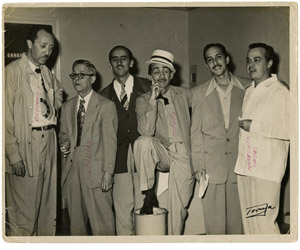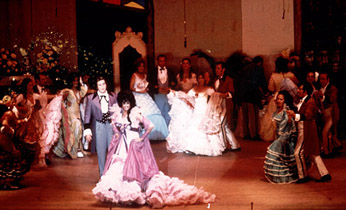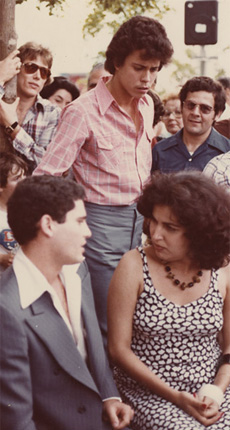News Release
UM Libraries’ Digital Preservation Project Brings Miami's Cuban Theater History to Light
MIAMI, May 15, 2012 —The University of Miami Libraries’ Cuban Heritage Collection (CHC) announces the completion of a major project that preserves and enhances access to sources of Cuban and Latino theater through digitization. This project was made possible through a grant from the John S. and James L. Knight Foundation. The digital preservation of these materials led to the creation of an online exhibition titled “Cuban Theater in Miami: 1960-1980.”
“Knight Foundation has enabled the UM Libraries’ Cuban Heritage Collection to preserve important performing arts materials for future scholarship and research,” said William Walker, Dean and University Librarian. “This project makes hidden collections discoverable to performing artists, students and the artistic community worldwide.”

Leopoldo Fernández "Pototo" (1904-1985)
One of the most popular performers both in Cuba and among Miami exiles was Leopoldo Fernández.The renowed comedic actor was expelled from Cuba's National Theater in 1963. This photograph shows Fernández (third from the right) with the cast of the popular Cuban radio and television program, La tremenda corte, in which he played the character of José Candelario "Tres Patines." | Read more >
“The performing arts are integral to our community’s cultural vitality. Performance, however, is by nature ephemeral. Documenting and preserving our local theater history through the university’s project is an important way to promote Miami’s collective identity, memory and history,” said Dennis Scholl, Knight Foundation’s vice president/arts.
Approximately 2,000 items were digitized for preservation from collections of ephemera and the papers of theater directors, actresses, playwrights, and companies. As the project progressed, a community’s story unfolded. The selection of playbills, posters, photographs, and recordings illustrate the story of the Cuban diaspora community and the larger context of the multi-ethnic Miami community.
Dr. Lillian Manzor, Associate Professor in the University of Miami’s College of Arts and Sciences Modern Languages and Literatures Department and Dr. Beatriz Rizk, instructor with Miami Dade College’s Teatro Prometeo, were asked to curate the online exhibition, which is now available via the project’s website at http://scholar.library.miami.edu/miamitheater/

The Enduring Legacy of Lyric Theater
If the zarzuela was the theatrical genre favored by Cuban audiences in the first half of the 20th century, it is not surprising that the early exiles, composed mainly of Cuba's upper-middle classes, very soon started to produce in Miami the lyric genre in general and zarzuelas. | Read more >
"These materials have allowed us to unveil the role Cuban theater played in the transformation of Miami's socio-cultural and economic fabric,” said Dr. Manzor.
Over the years the UM Libraries’ Cuban Heritage Collection has increased access to its rare and exceptional materials through digital scholarship development. The UM Libraries and faculty member Dr. Manzor have developed an additional resource for documenting Cuban performance: the Cuban Theater Digital Archive.
The exhibition Cuban Theater in Miami: 1960-1980 and the Cuban Theater Digital Archive enhance the UM Libraries’ commitment to expanding access to materials and the preservation of such important collections. Currently, the UM Libraries’ Digital Collections includes over 70 digital collections with over 50,000 cross-searchable items. These rich collections include sheet music, photographs, media, manuscripts, correspondence, interviews, books, periodicals and other materials. Many of these collections have substantial resources covering events and history within South Florida, Cuba, and the Caribbean.
About the University of Miami
The University of Miami’s mission is to educate and nurture students, to create knowledge, and to provide service to our community and beyond. Committed to excellence and proud of the diversity of our University family, we strive to develop future leaders of our nation and the world. www.miami.edu
About the Cuban Heritage Collection
The Cuban Heritage Collection at the University of Miami collects, preserves, and provides access to primary and secondary sources of enduring historical, research, and artifactual value which relate to Cuba and the Cuban diaspora from colonial times to the present. The Collection supports the teaching, learning, and research needs of the University of Miami and the broader scholarly community.
About the UM Libraries
The University of Miami Libraries rank among the top 50 research libraries in North America. With a combined collection of 3.3 million volumes, the Libraries are strategically focused on building the University of Miami Virtual Library, growing the Libraries' special collections, and engaging the Libraries in the research, teaching, and learning enterprises of the University, especially through the application of transformative technologies and new media. The Otto G. Richter Library sits in the heart of the campus and serves as the central library for the University. The rare and rich primary sources held in the Libraries’ Special Collections and Cuban Heritage Collection provide the foundation for original scholarship. The Libraries’ collections are especially strong in manuscripts, images, and books from the diaspora of Cuba, the Caribbean and Latin America. The Libraries Digital Scholarships and Programs is responsible for the creation and expansion of digital technologies, services, and unique resources that facilitate and enhance learning, teaching, and research. Other University of Miami Libraries include the Paul Buisson Architecture Library, the Judi Prokop Newman Business Information Resource Center, the Marta and Austin Weeks Music Library, and the Rosenstiel School of Marine and Atmospheric Science Library. The University also has independent medical and law libraries. The Libraries provide support and services for approximately 10,400 undergraduates, 5,200 graduate students, and 13,000 full- and part-time faculty and staff.
